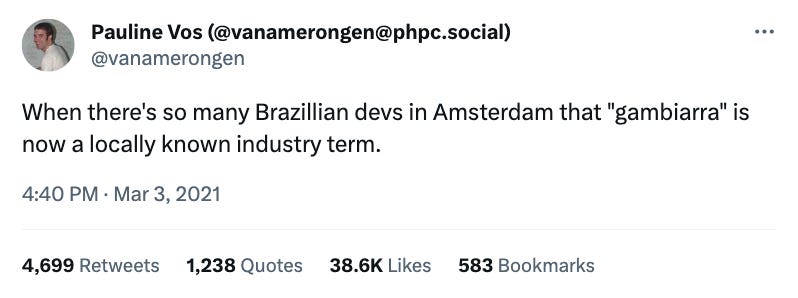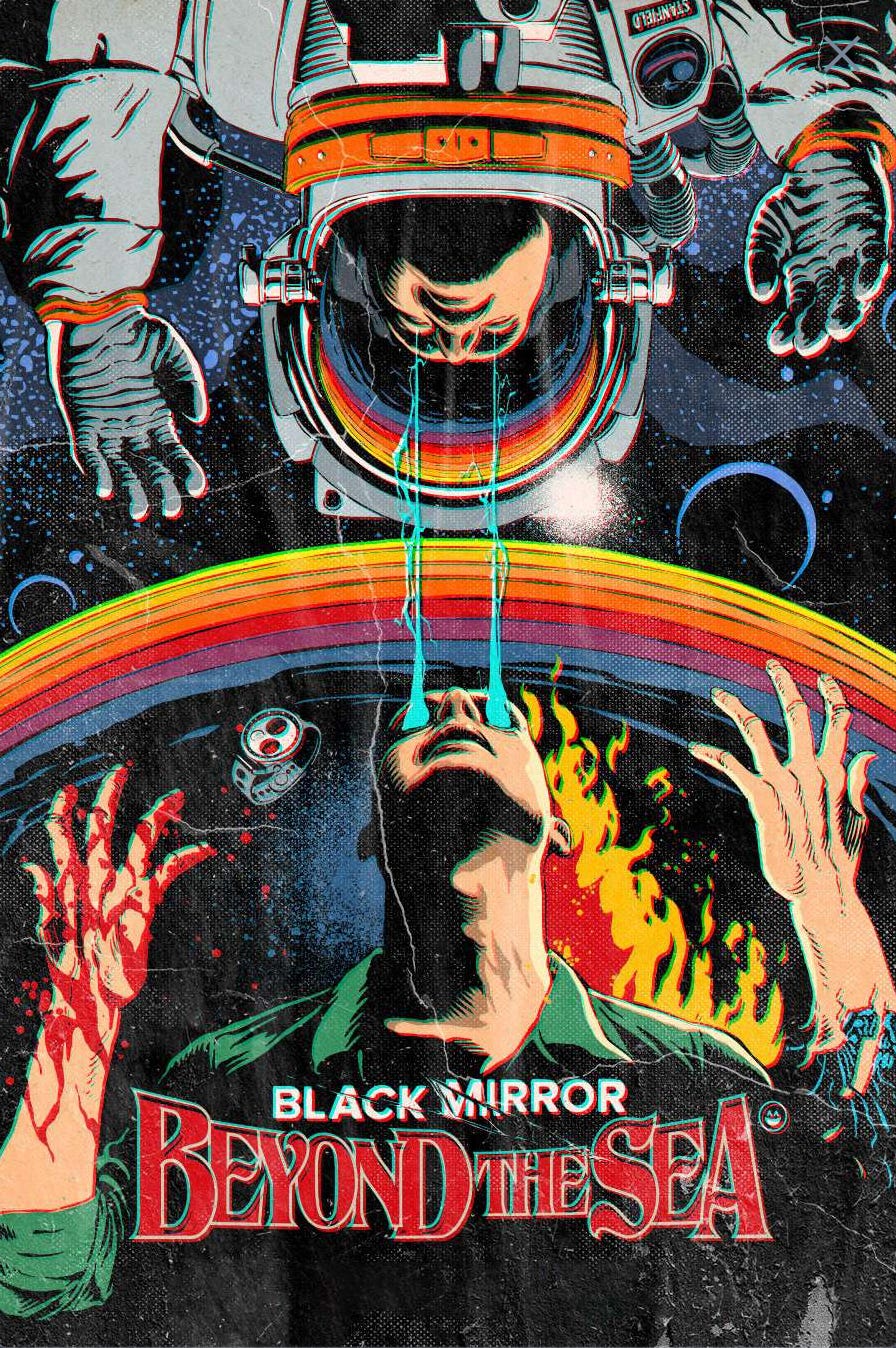🧚♂️✨The Nexialist #0127
self-fulfilling cyberpunk | cypherpunk, solarpunk and lunarpunk | gambiarra > kludge | beyond the sea | the alpha male myth | colonial masculinity | male objectification through the ages
welcome to your virtual weekly zine filled with love and links, the nexialist
hello, you! i hope this e-mail finds you well, as we reach the middle of 2023. this week i’m taking you by the hand to check out more reads than usual, going from futures thinking and imagining to a masculinities time-travel. i’ll keep the intro short and sweet so you can skip right to the content. enjoy! 🫀
1 year ago » i was on a break 👙
2 years ago » 👁✨The Nexialist #0026 : Discriminator | Cyberpunk in Brazil | Third Eye(lid) | Eye Floaters | Distorted Light Beam | Shygirl's BLU | Sad and Horny | More Rita Lee
👾self-fulfilling cyberpunk
"If everyone believes the future is dystopian, could that cause us to make it dystopian?"
i think a lot of people immediately connect the sci-fi genre with cyberpunk narratives, and freyja sewell reminds us how these futures were mostly created by white western men. don’t get me, or her, wrong. cyberpunk stories are super complex, rich, and bring great insight into futures where unbalanced power structures are highlighted. but freyja is inviting us to question these futures, especially concerning the ai debates we are going through now. if you don’t want spoilers, don’t read the following part:
Imagine if all the voices, previously ignored by our listening to only one group, felt empowered to create their own visions. Imagine if, rather than only thinking about a narrow type of mechanistic technology, we started exploring things like wet computing, DNA bio printing, mycelium materials.
What would a world that was grown rather than extracted and constructed look like? Imagine if the recent rise of ancient and indigenous culture was included, technologies of psychedelic ceremony and healing intertwining with our AIs and understanding of interconnectivity.
via
🌚cypherpunk, solarpunk and lunarpunk
like a glove, gustavo sent me this text by dr. paul j. dylan-ennis while i was putting together this week’s issue. i was quite used to the solarpunk term, sometimes mentioned as the opposite of cyberpunk, but this brought my attention to cypherpunk and lunarpunk. the context is more in web3, and that brings other layers i hadn’t considered before.
it was a great read to recapitulate the story of solarpunk and add these other layers. i don’t think i had learned before that solarpunk came out of latin america, and maybe that’s why i connect to it so much. in his text, dr. dylan-ennis manages to do great world-building exercises based on web3, and these forces of cypherpunk, solarpunk and lunarpunk, seem like great alternatives to cyberpunk, especially if coexisting.
Cypherpunk is a well-worn path in the history of crypto/Web3. It was a core influence on Satoshi Nakamoto, who chose a cypherpunk mailing list to announce Bitcoin. Cypherpunks have a punkish DIY attitude toward open-source development, usually oriented toward the creation of credibly neutral protocols. They highly value privacy. Ethereum’s cypherpunks are often the hacker-engineer developers who maintain the Ethereum protocol.
[…]
However, within the Web3 context, solarpunk refers to a political aesthetic that promotes positive externalities, positive-sum worlds and public goods in Web3 and beyond – what I call the “three Ps.” Crypto’s solarpunks are characterized by a commitment to collaboration, optimism and are green-pilled.
[…]
Lunarpunk also pre-exists its Web3 form, but in a much more obscure and niche sense as a mystical brand of solarpunk. It was also very nature-oriented, but a little more pagan and witchy. Think psy-trance festival in a small college town…
brainsparks: solarpunk and the end of capitalist (tn#40) and can solarpunk save the world? (tn#97)
🪤gambiarra > kludge
kludge | noun | KLOOJ
A kludge is a haphazard or makeshift solution to a problem and especially to a computer or programming problem.
// Andy knocked out a hasty kludge to circumvent the glitch until a more robust solution could be developed.
kludge showed up as one of the words of the week, and it is completely new to me. in the context of cypherpunk i had to share it here, with it’s brazilian synonym which is taking over the world: gambiarra: “a brazilian expression. it basically means to use improvised methods / solutions to solve a problem, with any available material.”
🧑🚀beyond the sea
In an alternative 1969, two men on a perilous high-tech mission wrestle with the consequences of an unimaginable tragedy.
yes, i know, this sixth season of black mirror seems not to be such a crowd-pleaser. i agree it’s not the best, but i still had fun watching it (it came out on my birthday so i did feel special). i thought it was quite meta, and also looking at how technologies that are already available brought change into our social dynamics. also it had more fantasy elements than usual, which is a bit weird.
but the third episode, beyond the sea, might have been my favorite (and omg look at this poster, it’s so nice!) i loved its references: valley of the dolls, some lana del rey aesthetics, and the costumes made me think of sci-fi books from the 50s. to my surprise, one of my favorite books made a cameo appearance: the illustrated man, by ray bradbury, the first book i had to read in english. it is also the book that inspired me to get my tattoos:
The unrelated stories are tied together by the frame story of "The Illustrated Man", a vagrant former member of a carnival freak show with an extensively tattooed body whom the unnamed narrator meets. The man's tattoos, allegedly created by a time-traveling woman, are individually animated, and each tells a different tale.
okay, back to the episode (spoiler alert!). one of the main things that got my attention was the masculinity issues: power and dominance, distance and loneliness, inability to show feelings, a certain discomfort in being in that role, and despite the opposing forces of the main characters, they still had things in common. i still don’t know exactly how to put it into words, but it made me feel so many things.
🧚♂️the alpha male myth
in a world where (i’m struggling to believe it’s true) zuckerberg and musk are making wasting headlines about being in a cage fight, this lesson about alpha males from primatologist frans de waal is necessary. once again, humans getting nature wrong. very wrong.
People sometimes ask me, what does it take to be an alpha male? And they think the answer from a primatologist would be, what it takes is to be the strongest and the meanest and the most intimidating. But that's not really what an alpha male usually is. An alpha male is usually also admired. They protect the underdog, they break up fights, they have a high level of empathy. So, yeah, you may want to be an alpha male but if you're surrounding people don't see you as that, it's not going to happen.
also read: Instead of cage-fighting, how about a tech-bro competition to pay the most tax?
👨🏻colonial masculinity
nothing new under the sun, but i read this article by desi dwi prianti some time ago and it popped up in my mind again: The Identity Politics of Masculinity as a Colonial Legacy. while nations in europe have moved forward with gender and diversity politics, the damage in that realm made during colonization is still very much alive.
Prior to Dutch colonization, there was a clear distinction between men and women in Indonesia. However, the hierarchical structure between these gender categories is part and parcel of the colonial legacy. Masculinity was first introduced in Indonesia during the Dutch colonial period as a repudiation from femininity. This signaled a significant shift, as previously being modest and part of the community had been valued much more highly in Indonesian society than was individuality. By asking to what extent men’s gender expectations are subject to the identity politics of masculinity, and to what extent this is reflected on Indonesian popular culture specifically men’s lifestyle magazine, I intend to shed light on the incompatibility of the identity politics of masculinity with contemporary Indonesian men. Towards this goal, I analyse eight men’s lifestyle magazines, for they play a key role in contemporary modern societies, exposing men to generalized notions of what it means to be a ‘man’. Spanning the period from the earliest men’s lifestyle magazines published in Indonesia in the mid-1970s until 2015, I map contemporary narratives of masculinity in Indonesian context as a reflection of the effects colonial ideologies continue to have on Indonesian society and the division of gender roles.
via the syllabus
💪🏼mister ai beefcake
andré matarazzo from cubo shared with me an experimental project that they created. Mr. A.I. Beefcake “We’ve inputted into MidJourney on June 9th 2023: “The pinnacle of (country) male physical beauty” and this is what came back.” even though there are clear differences and stereotypes, there are also common features (i.e. muscles and square chins) that show how, at least in the world of midjourney, these standards are unattainable. not too different from instagram, right?
via: cubo’s newsletter, stardump
🍑male objectification through the ages
‘Objectification’ simply doesn’t sit well with our emancipated, liberal 21st century selves; in its simplest form it suggests the degrading of someone to the status of a mere object. Throughout history, the objectification of women, going hand in hand with gender discrimination, body dysmorphic disorders and sexual violence, is a familiar problem we know all too well. But what of male objectification?
cecile paul takes us on a trip through time of male objectification. i know, not a common topic, but she twists it in a beautiful way. from hunter-gatherer dynamics, to ancient egyptian and greek erotic potteries, to roman frescoes and renaissance nude statues, it’s all there. the ending got me though:
In the age of social media, both male, female and non-binary bodies are increasingly portrayed as objects that can be worked on to become more sexually attractive to others. The fashion and beauty industries, which have historically thrived on the practice of objectifying women, are becoming more gender inclusive, shifting their targets to men, transgender and genderqueer people.
So when it’s no longer just a women’s problem; when we come to realise that we’ve put the entire human race at risk of sexual objectification and all the mental health hazards that come with it, might we finally decide to stop doing it? Therein lies the eternal dichotomy: our lizard brains want to objectify ourselves and each other, while our 21st century brains know it’s a flawed and largely obsolete instinct. If history tells us anything, it’s going to be a hard habit to kick.
see you next week, [🫀]punks
❓If you want to know what a Nexialist is, click here.
🔎If you want to see what I’ve already posted, visit the archive and use the search engine. Even I do that a lot.
💌I want to know what you think/who you are! Your feedback is highly appreciated; you can e-mail me or fill in this short survey. Thank you! 🙏🏻
🔌Let’s Collab?
I truly believe innovation comes from bringing improbable areas together, and that’s why I called this project The Nexialist. Some sectors are known to be self-referencing and hermetic. Sometimes teams are on autopilot mode, focused on the daily grind, which hinders innovation. As a Nexialist, I like to burst these bubbles, bringing references from different areas, and maintaining teams inspired and connected to the Zeitgeist.
I offer inspiration sessions called Brainsparks, creative desk research (Zeitgeist Boost), Plug’n’Play deals for workshops and sprints, and other bespoke formats. If you want to know more about this, send me an e-mail with your challenge(s) and we can figure something out together. Check out my website and some work I’ve done below:










